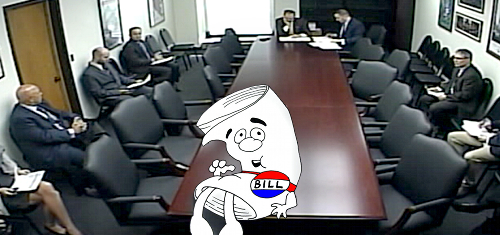 A New York Senate committee approved an online poker bill on Tuesday, but no one would blame you if you didn’t notice.
A New York Senate committee approved an online poker bill on Tuesday, but no one would blame you if you didn’t notice.
The state Senate Racing, Gaming and Wagering Committee scheduled a 9:30am hearing to consider Sen. John Bonacic’s S5302-B online poker bill, but anyone who didn’t have the livestream cued up at the precise hour would have missed the whole affair, which lasted less than four minutes despite addressing six separate pieces of legislation.
While the committee voted 9-0 in favor of advancing S5302-B, the vote didn’t take place before the cameras. Instead, chairman Bonacic merely asked if there were any questions, and upon receiving no questions, announced that S5302-B was now referred to the Senate Finance committee.
Bonacic subsequently issued a statement saying his poker bill had taken “a necessary step forward today with its vote out of the Racing committee.” Bonacic said he anticipates having “ongoing discussions with my colleagues in both Houses” regarding his bill, although he could have dropped the ‘ongoing’ bit, since the Schoolhouse Rock ‘how a bill becomes a law’ episode takes longer to watch than public discussion of S5302-B.
Regardless, Bonacic has reason to celebrate, as this marks the first time a New York online poker bill has made any legislative progress. The result also stands in stark contrast to the Racing committee’s previous meeting on Bonacic’s bill last September, in which the chairman spent the majority of the time as the sole politician listening to witness testimony.
The Senate Finance committee has yet to schedule a hearing on Bonacic’s bill, which would allow up to 10 online poker licensees, who would pay a $10m license fee and 15% of gross gaming revenue. A companion bill in the House introduced by Rep. Gary Pretlow last month is still waiting for its moment in the committee spotlight.
New York’s gaming market is currently in flux, as the focus is on the recently issued new non-tribal brick-and-mortar casino licenses and the state attorney general’s ongoing legal war with daily fantasy sports operators. For the moment, Bonacic’s bill may be benefiting from these distractions but more intense scrutiny is a given as it moves up the legislative food chain.
The Poker Players Alliance issued a statement praising the bill’s progress while urging legislators not to follow some of their colleagues’ suggestions that the issue of online poker be deferred until the state’s new casinos are up and running. The PPA said opening online poker sites now would ensure these casinos have an existing clientele when their as yet unbuilt poker rooms finally open.






